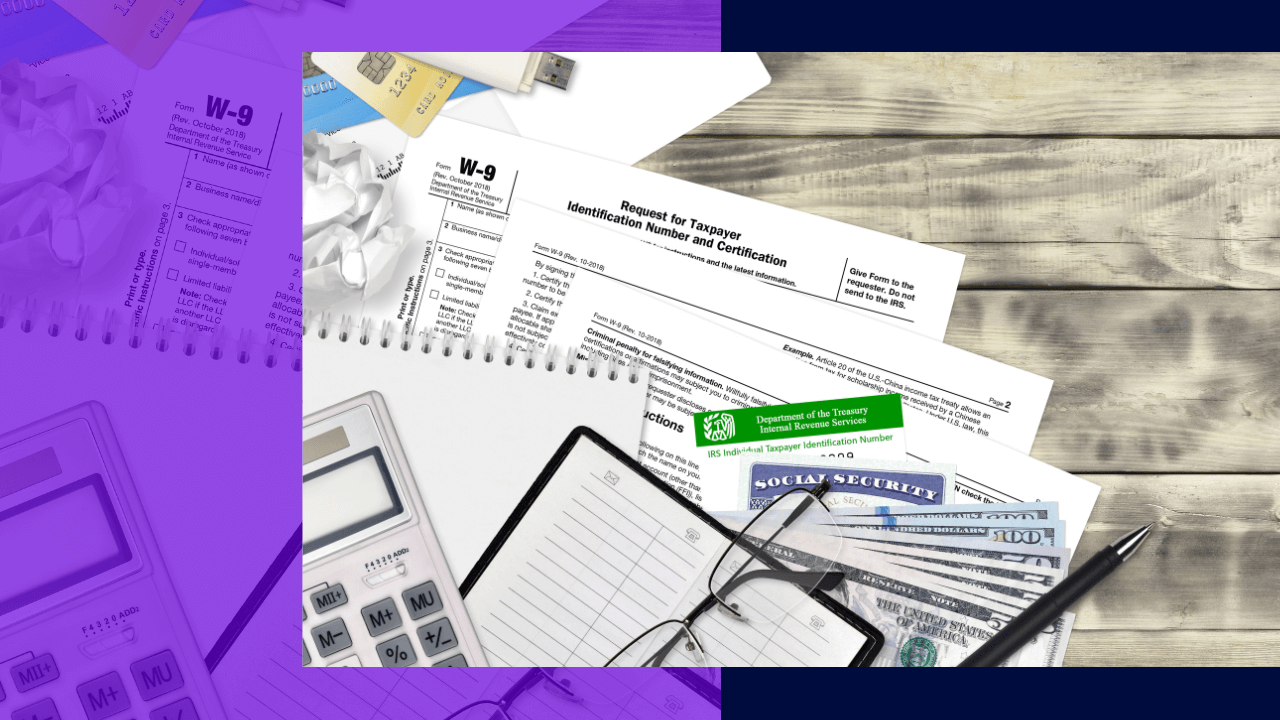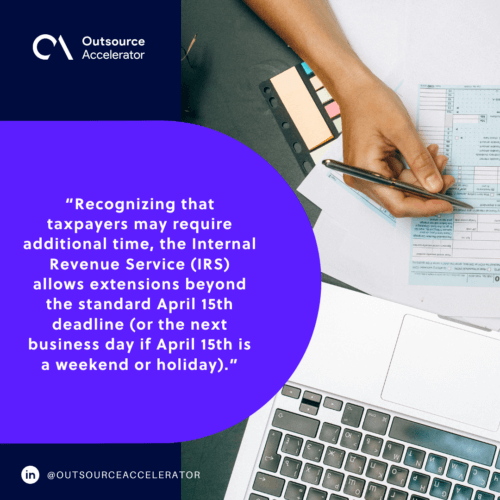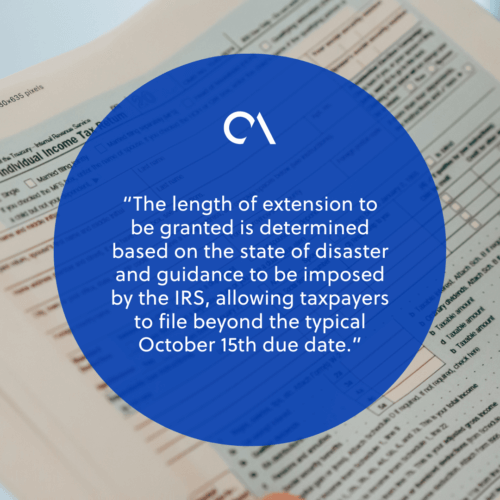Deadline for income tax returns with approved extensions

Monitoring tax payments is especially important during tax season, as the standard deadline (the 15th of the month) is sometimes not enough time to gather and prepare all required documents.
In response, tax authorities may grant deadline extensions to give individuals and businesses more time to file their income tax returns and avoid penalties.
However, these extensions only apply to filing, not to payments. Taxes owed must still be paid by the original due date to avoid interest and late payment penalties.
Understanding tax deadlines and their specific requirements can help reduce the risk of penalties and ease the burden of compliance.
To stay on top of these responsibilities, many businesses now hire remote tax specialists to handle tax compliance and assist with administrative tasks.
This article outlines key information about extended deadlines for filing income tax returns—helping you stay informed and manage your tax obligations more effectively.
Understanding tax deadlines and extensions
It is always a competitive edge to understand your tax deadlines and extensions. The tax system requires complex computations strict schedules, and it can sometimes be viewed as a race against the calendar.
Recognizing that taxpayers may require additional time, the Internal Revenue Service (IRS) allows extensions beyond the standard April 15th deadline (or the next business day if April 15th is a weekend or holiday).
Many individuals and businesses take advantage of this option when they need additional time to gather documents and prepare their income tax returns.

Potential penalties and interests can be avoided by filing tax extensions. However, it is essential to note that even if you applied for an extension, the deadlines for payments will not be adjusted. Taxes owed are still due by the original deadline.
Late tax payments results to a 0.5% penalty based on the total amount of taxes calculated per month, while late filing incurs a much higher penalty of 5% per month.
When should you file for an extension?
A taxpayer should file for an extension with practicality and assessment to the degree of circumstances.
Unexpected situations like system malfunction, natural disaster, or absence of key personnel may warrant an extension aside from missing some crucial documents and forms.
Filing of extension may vary depending on the business structure. An individual and C corporation can file an extension until April 15th, while an S corporation and partnership are until March 15th.
Taxpayers may file extensions based on the last day of the standard filing deadline and are given automatic six additional months to comply with the requirements.
Partnerships and S corporations are given until September 15th to submit required documents, while individual or sole proprietors and C corporations may submit until October 15th.
Why should you file for an income tax return extension?
Extensions only grant an additional six months for filing income tax returns. It does not extend the tax deadline for any taxes that you owe.
Individuals and businesses must still pay their estimated tax liability by the original due date to avoid accruing interest and late payment penalties.
Maximizing the use of extension responsibly can help you eliminate additional expenses due to errors and promote more comprehensive and accurate filing of taxes.
To meet deadlines more efficiently, many businesses now rely on professional tax software to streamline the filing processes, manage digitize forms and stay organized.
Who are qualified to get an additional extension?
While the majority of taxpayers receive a six-month extension, the following individuals or groups are eligible for even more time than the usual October 15th cutoff:
1. Military personnel in combat and war zones:
Military personnel, specifically those assigned in combat and war zones or identified hazardous duty locations, are automatically granted an IRS extension.
They are given an additional 180 days to process their respective tax return and settle outstanding tax obligations after departing for combat or war zone areas.
2. Those affected by natural disasters
There is also an automatic extension granted to taxpayers operating a firm or residing in a federal area affected by the disaster.
The length of extension to be granted is determined based on the state of disaster and guidance to be imposed by the IRS, allowing taxpayers to file beyond the typical October 15th due date.

3. U.S. Citizens living abroad
U.S. citizens and resident aliens living outside the United States are automatically granted a two-month extension from the regular April 15th deadline, giving them until June 15th to file their tax return.
If more time is needed beyond June 15th, taxpayers can file Form 4868 to request a standard six-month extension, which moves the deadline to October 15th.
In rare cases, if a taxpayer still cannot file by October 15th, they may write directly to the IRS to request an additional extension. These requests must include a valid reason and are subject to IRS evaluation and approval.
4. Taxpayers facing medical concerns and other rare conditions
The IRS may grant additional time to file income tax returns for taxpayers facing serious medical conditions or other exceptional circumstances.
Such situations may include severe health issues that require intensive treatment or medication, making it difficult or impossible for the taxpayer to prepare and submit their tax documents on time.
These cases are reviewed on an individual basis and require proper documentation.
Taxpayers in these rare circumstances must formally request an extension and provide a valid explanation for the delay, which the IRS will evaluate for approval.
Filing income tax returns for 2025
Based on IRS guidelines, individual taxpayers, sole proprietors, and C corporations have until April 15, 2025, to file for taxes, while S corporations and partnerships have until March 17, 2025.
Aside from federal tax obligations, taxpayers should also explore state-specific requirements for filing income tax returns and their respective extension rules.
Looking forward to 2025, taxpayers should note these important dates and future deadlines pertaining to income generated from January 1 through December 31, 2025:
Key tax deadlines for the year 2025:
- April 15, 2026: April 15 is the general deadline for most taxpayers to file their federal income tax returns and pay their respective tax obligations.
- October 15, 2026: This is the extended date if you file for an extension of standard six months from the original April 15 deadline.
Remember that filing an extension does not cover any additional extension to pay your owed taxes by April 15. Monitor your payments to avoid any interest and penalties.
Estimated tax payment deadlines for 2025 income:
Self-employed individuals who make significant income, including income that is not subject to withholding, need to make tax payment estimates to avoid any penalties that may occur.
Tax payment due dates for the year 2025 are as follows:
- The 1st Quarter (January 1 – March 31, 2025) is due on April 15 (This deadline has already passed);
- The 2nd Quarter (April 1 – May 31, 2025) is due on June 16 (given that June 15, 2025, is a Sunday);
- The 3rd Quarter (June 1 – August 31, 2025) is due on September 15; and
- The 4th Quarter (September 1 – December 31, 2025) is due on January 15.
Standard forms used by individual taxpayers:
It refers to the form that is primarily intended for most individual taxpayers to file their personal income tax returns. Another form, called 1040-SR, is used as an alternative for taxpayers aged 65 and older.
Additionally, form 1040-ES is used to calculate and derive estimated tax payments for individual taxpayers.
- Schedules A, B, C, D, E, F, SE, etc
These are additional forms that may be attached to Form 1040, considering the taxpayer’s income, credits, and deductions (e.g., Schedule A for itemized deductions and Schedule C for income of self-employed individuals).
This form is intended to be forwarded to employees from their respective employers, indicating an employee’s wages and withheld taxes.
This form is used to report other types of income with various versions, including 1099-NEC for non-employee compensation, 1099-DIV for dividends, and 1099-K for third-party payment network transactions.
Avoiding penalties: Paying tax extensions accurately
Knowing how to differentiate the benefits of having tax extensions and your obligations to still pay on the set due dates can spare you from any penalties or interest for late payments.
Comprehensively monitoring your tax estimates and liabilities on the original deadline and your new deadline for filing taxes after an extension is crucial to ensure sound recording of financial transactions.
Today, more businesses are now maximizing innovative ways, like outsourcing tax compliance, to promote financial stability and excellent compliance with the IRS regulations.
Taking these guides will not only spare taxpayers from late payments but also provide ways to acquire additional time to prepare and file accurate income tax returns.







 Independent
Independent




